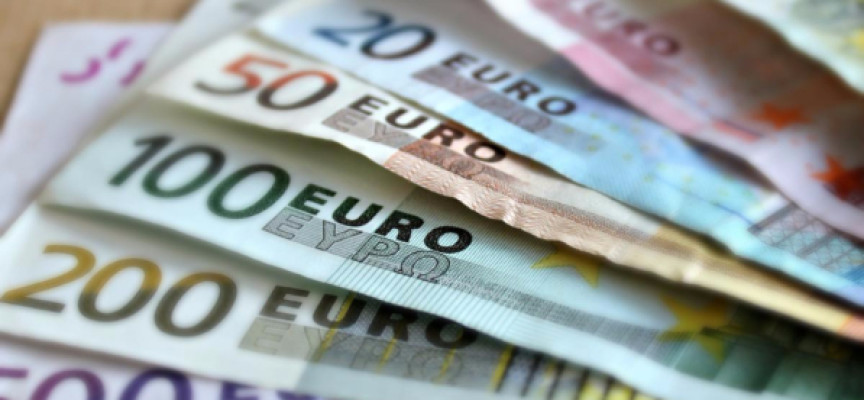American presidential candidates are not the only people who boast how “clever” they are when facing accusations that, as multi-millionaires, they have not paid a single cent of income tax for many years. There are also thriving corporations based in Europe, such as Apple, McDonald’s and Starbucks, that rely upon the legality of their actions to justify the absurdly low level of taxation of their profits.
Growing global inequality
These examples reveal that the effect of national taxation systems on redistribution is diminishing, which stands in stark contrast to globally increasing income and wealth inequality. This trend is also seen in European countries, especially in Germany, which holds the inglorious position of being top of the tree regarding wealth inequality.
While these countries have seen stagnation in earned income for more than 20 years and, according to the OECD, the low-wage sector with its “atypical employment” has expanded to take a 40% share of all employment, over the same time span there has been a clearly marked increase in corporate income and investment income. As demonstrated by Stefan Bach from the German Institute for Economic Research, however, the tax burden has shifted – especially as a result of the reforms of the 1990s – to the detriment of low-income households while indirect taxes (e.g. VAT, energy taxes) have been increased.
High-income, high-asset households, on the other hand, have seen their tax burden lightened, thanks to the abolition of some taxes (capital tax) and to tax reductions (e.g. corporate tax, flat-rate taxation of 25% on income from investments via a withholding tax). In view of this situation, there is much to recommend a Europe-wide tax on wealth to reduce the impact of the imbalances identified above.
The basic issue of justice
From a pragmatic point of view, it could be pointed out to wealthy individuals that such a growing inequality is in conflict with their best interests. In numerous studies, the International Monetary Fund emphasises that there is a correlation between rising income inequality and a significant slowdown in GNP growth. Put more simply, increasing prosperity for everybody is not achieved by assiduously piling money onto the top of the pyramid, hoping that it will then trickle down, because the upper part of the pyramid can only grow in proportion to the broadening of its foundation.
Independently of any pragmatic aspects, strong normative considerations seem to be in favour of the introduction of such a tax. Empirical findings raise a basic issue of justice. The tax system of a society is unfair if “unearned” increases in assets as a result of capital, property or inheritances are given preferential treatment in relation to increases in assets “earned” as a result of sheer hard work.
This devalues the principle that achievement must be worthwhile and that justice is related to earnings. In addition, asset increases from income sources that have little or no connection to the real economy and thus scarcely benefit the common good are rewarded, in contrast to asset increases generated by hard work.
Wealth tax as a question of fairness
As defined by the recently published book “Taxing the Rich”, by Kenneth Scheve and David Stasavage, professors who teach in Stanford and New York, one could argue that the introduction of a “wealth tax” is related not so much to the issue of inequality, but much more to the question of fairness. According to their analysis, it is justified best as a compensation for the privileged status of the super-rich, i.e. a kind of burden-sharing or recompense for the less well-off in the name of fairness.
One argument usually mainly presented against a “wealth tax” is that as a tool it is inappropriate. Doubts have been expressed that it would be feasible at national or European level, given that financial markets and tax competition are globalised. These objections must be taken seriously. Nevertheless, some convincing problem-solving approaches do exist, such as, for example the ideas presented by Peter Dietsch and Thomas Rixen, both professors of economics, in their book “Global Tax Governance – What’s Wrong With It And How to Fix It”.
If Europe is supporting taxation of this kind, this would be not only fair but also “clever”. This is how we could show that only a united Europe is in a position to make global corporate groups accountable for the common good.
Patrick Zoll SJ, lecturer in Political Philosophy and Social Ethics at the University of Munich
(source: Europeinfos #199; translated from the original text in German)
Non sono solo i multimilionari candidati alle elezioni presidenziali americane che si vantano di essere “intelligenti” quando posti di fronte al fatto che nel corso degli anni non hanno pagato un solo centesimo d’imposta sul reddito. Anche in Europa si trovano aziende fiorenti ma senza domicilio fiscale come Apple, McDonald’s o Starbucks, che sulla base della legittimità delle loro attività (imprenditoriali) giustificano l’irrisoria tassazione dei loro profitti.
Disuguaglianza globale in crescita
Questi esempi riflettono una diminuzione degli effetti redistributivi dei sistemi fiscali degli stati, in contrasto con una crescente uguaglianza della ricchezza e del reddito a livello globale. Questa tendenza vale anche per i Paesi europei, in particolare la Germania, che è il leader inglorioso in termini di disuguaglianza della ricchezza.
Mentre i redditi dei lavoratori in questo Paese ristagnano da più di 20 anni e secondo l’OCSE la fetta di lavoratori a basso salario, con il suo “rapporto di lavoro atipico”, è cresciuta fino al 40% del totale degli occupati, i redditi sulle imprese e sui capitali sono aumentati in modo significativo durante lo stesso periodo. Come ha dimostrato Stefan Bach dell’Istituto tedesco per la ricerca economica, soprattutto in seguito alle riforme degli anni ‘90, la pressione fiscale si è spostata a danno delle famiglie a basso reddito, poiché sono aumentate le imposte indirette (ad esempio l’IVA, le tasse sull’energia).
Per contro, i bilanci con alti redditi e ricchezze sono stati alleggeriti attraverso l’abolizione di alcune tasse (l’imposta patrimoniale) o la riduzione di altre (ad esempio l’imposta sulle società è passata a una tassazione forfettaria del 25% su reddito dei capitali attraverso le ritenute). In questo contesto, è evidente la necessità di una tassazione della ricchezza a livello europeo al fine di mitigare gli squilibri individuati.
Quale giustizia nella politica fiscale?
Sul piano pragmatico, i benestanti possono ben notare che una tale crescente disuguaglianza è in contraddizione con i propri interessi. Sono numerosi gli studi del Fondo monetario internazionale (FMI) a indicare che vi è una correlazione tra l’aumento delle disuguaglianze di reddito e un significativo indebolimento della crescita del prodotto interno lordo. Detto con un’immagine: non si raggiungerà l’aumento della prosperità per tutti, buttando a palate sulla punta della piramide nella speranza che poi scorrano verso il basso. Al contrario: la parte superiore della piramide può crescere solo nella misura in cui si allarga la base su cui poggia.
Indipendentemente dalle pragmatica, forti considerazioni normative sembrano soprattutto parlare a favore dell’introduzione di una simile tassa. L’evidenza empirica solleva una questione fondamentale di giustizia. Il sistema fiscale di una società è ingiusto se la crescita “immeritata” del patrimonio proveniente dal capitale, da proprietà o eredità è favorita rispetto alla crescita “meritata” del patrimonio che deriva dal lavoro.
Quindi si svaluta il principio secondo cui il lavoro deve essere ricompensato e la giustizia ha qualcosa a che fare con il profitto. Inoltre, si ricompensa un incremento della ricchezza proveniente da fonti di reddito senza alcuna o pochissima relazione con l’economia reale e quindi difficilmente a beneficio del bene comune, al contrario di una crescita del capitale generato da lavoro.
La tassa sulla ricchezza: questione di equità e di efficacia
In linea con il libro “Taxing the Rich“, recentemente presentato a Stanford e New York da Kenneth Scheve e David Stasavage, si potrebbe argomentare che l’introduzione di una “tassa sui ricchi” non è tanto legata a una questione di disuguaglianza, quanto a una questione di correttezza. Secondo la loro analisi, la tassa si giustifica come una compensazione per un privilegio di benessere, quindi come una sorta di perequazione degli oneri o di compensazione delle vittime in nome dell’equità.
Contro una “tassa sui ricchi” si avanza in primo luogo l’obiezione che non sia un mezzo adeguato. Si mette in dubbio la fattibilità nazionale o europea in considerazione della globalizzazione dei mercati finanziari e della concorrenza fiscale. Queste obiezioni devono essere prese sul serio. Ma non mancano nemmeno in questo caso soluzioni interessanti, come ad esempio quelle presentate dai professori di economia Peter Dietsch e Thomas Rixen nel loro libro “Global Tax Governance – What’s Wrong With It And How to Fix It”.
Se l’Europa si attiverà nel senso di una simile tassazione, ciò sarà non solamente giusto, ma anche “intelligente”. Poiché così si potrebbe mostrare che solo un’Europa unita è in grado di porre le multinazionali di fronte alla propria responsabilità per il bene comune.
Patrick Zoll SJ , docente di filosofia politica ed etica sociale presso la Scuola superiore di Filosofia di Monaco
(fonte: Europeinfos #199; versione originale dell’articolo in tedesco; traduzione italiana a cura di Eurcom)
Besteuerung von Reichtum in Europa
Nicht nur amerikanische Präsidentschaftskandidaten rühmen sich als „clever“, wenn sie mit dem Faktum konfrontiert werden, dass sie als Multimillionäre über Jahre keinen einzigen Cent Einkommenssteuer bezahlt haben. Es sind auch in Europa ansässige, florierende Unternehmen wie Apple, McDonald’s oder Starbucks, die sich auf die Legalität ihrer (unternehmerische) Aktivitäten berufen, um die lächerlich geringe Besteuerung ihrer Gewinne zu rechtfertigen.
Wachsende weltweite Ungleichheit
Diese Beispiele sind Ausdruck einer sinkenden Umverteilungswirkung durch staatliche Steuersysteme, die im Kontrast zu einer weltweit steigenden Einkommens- und Vermögensgleichheit steht. Dieser Trend gilt auch für die europäischen Länder, allen voran Deutschland, welches der unrühmliche Spitzenreiter in puncto Vermögensungleichheit ist.
Während die Erwerbseinkommen hierzulande seit mehr als 20 Jahren stagnieren und laut OECD der Niedriglohnsektor mitsamt seinen „atypischen Beschäftigungsverhältnissen“ auf 40% aller Beschäftigungsverhältnisse angewachsen ist, sind die Unternehmens- und Vermögenseinkommen in derselben Zeit deutlich gestiegen. Wie Stefan Bach vom Deutschen Institut für Wirtschaftsforschung nachweist, hat sich die Steuerlast hingegen – insbesondere durch die Reformen der 1990er-Jahre – zu Ungunsten von einkommensschwächeren Haushalten verschoben, weil indirekte Steuern (z. B. Mehrwertsteuer, Energiesteuern) erhöht wurden.
Dagegen wurden Haushalte mit hohem Einkommen und Vermögen durch die Abschaffung von Steuern (Vermögenssteuer) oder die Senkung von Steuern (z. B. Unternehmenssteuer; pauschale Besteuerung von 25% auf Kapitalerträge durch die Abgeltungssteuer) entlastet. Vor diesem Hintergrund spricht viel für eine europaweite Besteuerung von Reichtum, um die identifizierten Schieflagen abzumildern.
Welche Gerechtigkeit in der Steuerpolitik?
Pragmatisch betrachtet können Vermögende darauf verwiesen werden, dass eine derartig wachsende Ungleichheit ihrem wohlverstandenen Eigeninteresse widerspricht. In zahlreichen Studien weist der Internationale Währungsfonds (IWF) darauf hin, dass es eine Korrelation zwischen steigender Einkommensungleichheit und einem signifikantem Abschwächen des Wachstums des Bruttoinlandsprodukts gibt. In ein Bild gebracht: Steigender Wohlstand für alle wird nicht dadurch erreicht, dass man fleißig Geld auf die Spitze der Pyramide schaufelt – in der Hoffnung, dass dieses dann herunterrieselt. Im Gegenteil: Der obere Teil der Pyramide kann nur in dem Maße wachsen, in dem man das Fundament verbreitert.
Unabhängig von der Pragmatik scheinen aber, vor allem starke normative Erwägungen für die Einführung einer solchen Steuer zu sprechen. Der empirische Befund wirft eine grundlegende Gerechtigkeitsfrage auf. Das Steuersystem einer Gesellschaft ist ungerecht, wenn „unverdiente“ Vermögenszuwächse durch Kapital, Immobilien oder Erbschaften im Verhältnis zu „verdientem“ Vermögenszuwachs durch Arbeit begünstigt werden.
So wird das Prinzip entwertet, dass Leistung sich lohnen muss und Gerechtigkeit etwas mit Verdienst zu tun hat. Darüber hinaus wird ein Vermögenszuwachs aus Einkommensquellen honoriert, der keinen oder nur einen sehr geringen realwirtschaftlichen Bezug hat und somit kaum einen Nutzen für das Gemeinwohl hat, ganz im Gegensatz zu Vermögenszuwächsen, die durch Arbeit generiert werden.
Reichensteuer als Frage der Fairness und Wirksamkeit
Im Sinne des Buches „Taxing the Rich“, das kürzlich die in Stanford und New York lehrenden Professoren Kenneth Scheve und David Stasavage vorstellten, könnte man insofern dafür argumentieren, dass die Einführung einer „Reichensteuer“ gar nicht so sehr an die Frage von Ungleichheit rückgebunden ist, sondern vielmehr eine Frage der Fairness ist. Gemäß ihrer Analyse rechtfertigt sie sich am besten als Kompensation für eine Privilegierung der sehr Wohlhabenden, also als eine Art von Lasten- bzw. Opferausgleich im Namen der Fairness.
Gegen eine „Reichensteuer“ wird vornehmlich vorgebracht, dass sie als Mittel ungeeignet ist.
Gezweifelt wird etwa an ihrer nationalen bzw. europäischen Umsetzbarkeit mit Hinweis auf die globalisierten Finanzmärkte und den Steuerwettbewerb. Diese Einwände sind ernst zu nehmen. Doch fehlt es auch hier nicht an überzeugenden Lösungsansätzen, wie sie zum Beispiel von den Wirtschaftsprofessoren Peter Dietsch und Thomas Rixen in ihrem Buch „Global Tax Governance – What’s Wrong With It And How to Fix It“ vorgestellt werden.
Wenn sich Europa für eine solche Besteuerung einsetzt, dann ist dies aber nicht nur gerecht, es wäre auch „clever“. Denn so könnte man zeigen, dass nur ein vereintes Europas in der Lage ist, weltweit agierende Konzerne in die Verantwortung für das Gemeinwohl zu nehmen.
Patrick Zoll SJ, Lehrbeauftragter für Politische Philosophie und Sozialethik an der Hochschule für Philosophie München
(quelle: Europeinfos #199)
Imposition de la richesse en Europe
Les candidats à l’élection présidentielle américaine n’ont pas été les seuls à se vanter de leur habileté lorsqu’ils se trouvent confrontés au fait de n’avoir pas déboursé, en tant que multimillionnaires, un seul cent d’impôt sur le revenu pendant des années. De même, certaines entreprises florissantes établies en Europe, comme Apple, Mc Donald’s ou Starbucks, se prévalent de la légalité de leurs activités pour justifier l’imposition ridiculement faible de leurs bénéfices.
Des inégalités mondiales croissantes
Ces exemples traduisent une baisse de l’effet de la redistribution, par les systèmes d’imposition nationale, qui contraste avec une hausse de l’égalité des revenus et de la richesse dans le monde. Cette évolution concerne également les pays européens, au premier rang desquels l’Allemagne, qui est le leader peu glorieux en termes d’inégalité de la richesse.
Alors que les revenus du travail stagnent ici depuis plus de vingt ans et que, selon l’OCDE, le secteur des emplois à bas salaire avec ses «emplois atypiques» a enregistré une augmentation de 40 % de l’emploi total, les revenus de l’entreprise et du capital sont nettement en hausse au cours de la même période. Comme Stefan Bach, de l’Institut allemand de la recherche économique (Deutsches Institut für Wirtschaftsforschung) en fournit la preuve, la pression fiscale s’est en revanche déplacée – en particulier en raison des réformes des années 1990 –pour incider négativement sur les ménages à revenus modestes, parce que les impôts indirects (par exemple la taxe sur la valeur ajoutée, les taxes sur l’énergie) ont été relevées.
A contrario, les ménages privilégiés en termes de revenu et de fortune ont été exemptés de certains impôts (abolition de l’impôt sur la fortune) ou ont bénéficié de la réduction d’autres impôts (par exemple les impôts sur les sociétés, l’imposition forfaitaire de 25 % sur les revenus du capital par le biais d’un impôt à la source libératoire). Dans ce contexte, nombre d’éléments plaident en faveur d’une taxation de la richesse à l’échelle européenne, afin d’atténuer les déséquilibres relevés.
Quelle équité en matière fiscale ?
D’un point de vue pragmatique, il conviendrait de rappeler aux personnes fortunées qu’une telle croissance des inégalités est contraire à leur propre intérêt bien compris. Dans plusieurs études, le Fonds monétaire international (FMI) fait observer qu’il existe une corrélation entre l’inégalité de rémunération croissante et un affaiblissement significatif de la croissance du produit intérieur brut. Pour employer une image: l’accroissement de la prospérité générale ne résulte pas de l’accumulation incessante de capitaux au sommet de la pyramide – dans l’espoir que cette richesse ruisselle vers le bas, mais le sommet de la pyramide ne peut s’élever qu’à mesure que l’on en élargit la base.
Mais, indépendamment du pragmatisme, de fortes considérations normatives semblent surtout parler en faveur de l’instauration d’un tel impôt. Ce constat empirique soulève une question d’équité fondamentale. Le système fiscal d’une société est injuste lorsque les augmentations «imméritées» du patrimoine provenant du capital, des biens immobiliers ou des successions sont favorisées par rapport à une augmentation «méritée» du patrimoine découlant du travail.
Ainsi voit-on se dévaloriser le principe selon lequel le travail doit être récompensé et selon lequel la justice a quelque chose à voir avec le profit. Qui plus est, on valorise une croissance de la richesse provenant de sources de revenus qui n’a aucun rapport ou qu’un faible rapport avec l’économie réelle et n’a donc aucune utilité pour l’intérêt général, contre les augmentations de richesses générées par le travail.
L’impôt sur la fortune : une question d’équité et d’efficacité
Dans l’esprit de l’ouvrage «Taxing the Rich», présenté récemment par les auteurs Kenneth Scheve et David Stasavage, professeurs enseignant à Stanford et à New York, on pourrait faire valoir sur ce point que l’instauration d’une «imposition des riches» n’est pas tant liée à la question de l’inégalité qu’à celle de justice («fairness»). Conformément à leur analyse, cette mesure se justifie au mieux comme compensation d’un traitement privilégié des nantis, ainsi donc comme une sorte de péréquation des charges ou de dédommagement des victimes au nom de l’équité.
C’est surtout le caractère impropre d’un «impôt sur les riches» comme dispositif qui est dénoncé. Des doutes sont émis quant à sa mise en œuvre nationale et européenne, compte tenu de la mondialisation des marchés financiers et de la concurrence fiscale. Ces objections sont à prendre au sérieux. Toutefois, il ne manque pas, ici non plus, de solutions convaincantes, telles que les présentent les économistes Peter Dietsch et Thomas Rixen dans leur livre «Global Tax Governance – What’s Wrong With It And How to Fix It».
Si l’Europe prend fait et cause pour ce type de taxation, ce sera alors non seulement justice, mais cela serait également faire preuve d’une certaine habileté. Car on pourrait ainsi montrer que seule une Europe unie est en mesure de responsabiliser des entreprises d’envergure mondiale en faveur de l’intérêt général.
Patrick Zoll SJ, Chargé de cours de philosophie politique et d’éthique sociale à l’École supérieure de philosophie de Munich (Hochschule für Philosophie München)
(source: Europeinfos #199; Version originale de l’article : allemand)
Latest posts by EURCOM (see all)
- What are the aims of the European security and defence policy? - 12 aprile 2017
- The Church is for the European project - 28 marzo 2017
- A message for Europe - 28 marzo 2017











